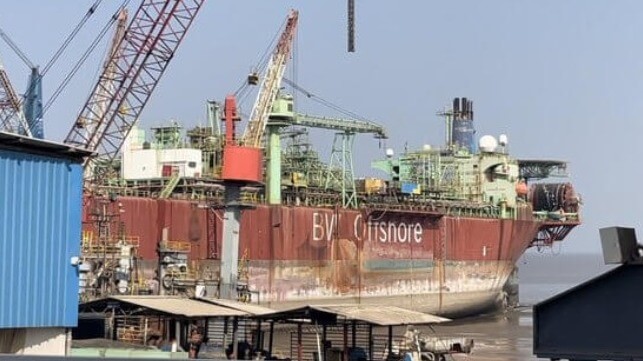BW Offshore Denies NGO’s Claim of Ship Recycling Accident in India

BW Offshore, one of the largest operators of floating offshore energy vessels (FPSOs) finds itself involved in a “war of words” with an NGO over the company’s efforts to properly recycle its end-of-life FPSOs. NGO Shipbreaking Platform issued a statement picking up on a report from German media saying that one of BW Offshore’s former vessels had been the site of an accident at a scrapyard in India and questioned the company’s recycling efforts. The ship operator responded with a statement denying the NGO’s statements and directing questions to the scrapper.
In February 2022, BW announced that its retired FPSO BW Cidade de São Vicente was going to be recycled at Priya Blue Industries in Alang, India. While the Indian shipyards are not accredited by the European Union, BW Offshore highlighted that it was taking steps to ensure the responsible recycling of the vessel. They said that the yard is certified to ISO standards and has been issued with a Statement of Compliance by Class NK following the IMO as well as the Hong Kong International Convention for the safe and environmentally sound recycling of ships.
Further, the company said a recycling plan had been prepared with the yard and that it would have third-party monitoring for compliance with health, safety, and environmental regulations. They also said they would pay a “safe recycling” bonus upon completion to incentivize safe operations by the scrapper.
NGO Shipbreaking Platform issued a statement today saying that there had been an accident at the yard killing one worker. They contend that the accident took place at the BW Cidade de São Vicente when a nitrogen tank was removed from the vessel and exploded killing the worker.
“The company can confirm that it, on April 21, was informed about a fatal accident at Priya Blue plot V1. The accident was unrelated to the ongoing recycling of former BW Offshore FPSOs at the yard,” BW Offshore responded in its statement. The company said its representative was in touch with the yard and offered to assist while referring all further questions to the scrapper in India.
In addition to saying that the FPSO was the site of the accident, the NGO also commented on the Indian yard while contending that BW Offshore had taken a higher value offer from the Indian yard versus a “more sustainable solution for the recycling of the vessel,” at a dry-dock and steel production facility in the Middle East.
Priya Blue Industries was amongst the first yards in India to obtain a so-called “Statement of Compliance with the Hong Kong Convention” from Japanese ClassNK, and is also a member of the Sustainable Shipping Initiative since 2018, acknowledged the NGO. They however contend that the yard along with others in Alang was cited in a European Commission audit for a series of structural deficiencies. They said this includes the lack of infrastructure to contain pollutants in the primary cutting area, the non-existence of capacity to handle several hazardous wastes originating from ships downstream, the absence of medical facilities, and breaches of labor laws.
Ingvild Jenssen, Executive Director of NGO Shipbreaking Platform said the group was encouraging BW Offshore to ensure that its end-of-life fleet is managed exclusively in facilities that can ensure the highest environmental and social standards. “When safer alternatives to beaching exist, ignoring the social and governance failings in Alang and contributing to the greenwashing of an outmoded and polluting method for the sake of more money is simply not acceptable anymore."
BW Offshore announced a month ago that it had sold a second vessel, FPSO Umuroa, also for recycling in India. They again stated that the yard is certified to ISO standards and has been issued with a Statement of Compliance by Class NK. They again will have a third-party representative and were offering a safe recycling incentive.
The debate over the use of South Asian yards for the end-of-life vessels continues with NGO Ship Breaking reporting in its annual report that those yards accounted for three-quarters of all vessels sold to be dismantled in 2021. They said that 583 of the largest tankers, bulkers, floating platforms, cargo- and passenger ships ended up on the beaches of Bangladesh, India, and Pakistan while citing reports of injuries, fatalities, and environmental pollution at the yards.
No comments:
Post a Comment